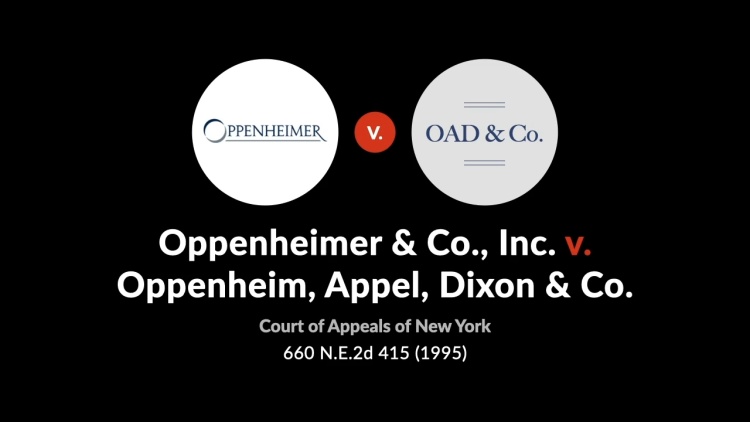Oppenheimer & Co., Inc. v. Oppenheim, Appel, Dixon & Co.
Court of Appeals of New York
86 N.Y.2d 685 (1995)
- Written by Matt Fyock, JD
Facts
Olympia offered to pay the rent for the remaining three years of Oppenheimer & Co., Inc.'s (Oppenheimer) (plaintiff) lease at One New York Plaza if Oppenheimer could not sublease the space. Olympia hoped that Oppenheimer would then agree to move into Olympia’s World Financial Center. In 1986, Oppenheimer and Oppenheim, Appel, Dixon & Co. (OAD) entered into a conditional letter agreement under which OAD would lease Oppenheimer’s space at One New York Plaza. The agreement required Oppenheimer to first obtain written consent of the landlord by a set date to proposed construction by OAD. The agreement provided that if Oppenheimer failed to obtain written consent, the agreement was to be deemed null and void. Oppenheimer’s attorney telephone OAD’s attorney on the day of the deadline and informed him that the landlord’s consent had been obtained. The following day, OAD informed Oppenheimer that the agreement and sublease were invalid for failure to timely deliver the landlord’s written consent. Oppenheimer filed suit for breach of contract, asserting that OAD waived or was estopped by virtue of its conduct from insisting on the physical delivery of the landlord’s written consent and that Oppenheimer had substantially performed the conditions set forth in the letter agreement. The jury awarded Oppenheimer damages of $1.2 million, but the trial court granted a motion for judgment notwithstanding the verdict on the substantial-performance issue. The appellate division reversed, allowing the jury verdict.
Rule of Law
Issue
Holding and Reasoning (Ciparick, J.)
What to do next…
Here's why 907,000 law students have relied on our case briefs:
- Written by law professors and practitioners, not other law students. 47,100 briefs, keyed to 996 casebooks. Top-notch customer support.
- The right amount of information, includes the facts, issues, rule of law, holding and reasoning, and any concurrences and dissents.
- Access in your classes, works on your mobile and tablet. Massive library of related video lessons and high quality multiple-choice questions.
- Easy to use, uniform format for every case brief. Written in plain English, not in legalese. Our briefs summarize and simplify; they don’t just repeat the court’s language.





